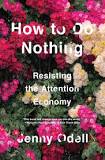Megan Marz at The Baffler:
 In her first chapter, “The Case for Nothing,” Odell recounts the near-daily visits she began making in 2016 to the Morcom Amphitheatre of Roses (a.k.a. the Rose Garden) in Oakland, California. Seeking post-election consolation, she sat in the public park, whose fragrant bushes are meticulously tended by volunteers, whose branching paths invite meandering, and whose architecture “holds open a contemplative space against the pressures of habit, familiarity, and distraction that constantly threaten to close it.” The difficulty of holding open space in the mind is mirrored by the difficulty of holding open space in public. Built by the Works Progress Administration, the Rose Garden was almost turned into condos in the 1970s. Local residents had to work together to block construction. The parallel Odell draws between the two struggles—for private, mental space and public, communal space—is characteristic of her method. She routinely finds formal similarities among seemingly disparate phenomena, thereby bringing them onto the same plane. In this case, the individual’s time to think and the public good become two bright points in the same constellation. “’Doing nothing’—in the sense of refusing productivity” entails both enjoyment of roses and birds, and “an active process of listening that seeks out the effects of racial, environmental, and economic injustice and brings about real change.”
In her first chapter, “The Case for Nothing,” Odell recounts the near-daily visits she began making in 2016 to the Morcom Amphitheatre of Roses (a.k.a. the Rose Garden) in Oakland, California. Seeking post-election consolation, she sat in the public park, whose fragrant bushes are meticulously tended by volunteers, whose branching paths invite meandering, and whose architecture “holds open a contemplative space against the pressures of habit, familiarity, and distraction that constantly threaten to close it.” The difficulty of holding open space in the mind is mirrored by the difficulty of holding open space in public. Built by the Works Progress Administration, the Rose Garden was almost turned into condos in the 1970s. Local residents had to work together to block construction. The parallel Odell draws between the two struggles—for private, mental space and public, communal space—is characteristic of her method. She routinely finds formal similarities among seemingly disparate phenomena, thereby bringing them onto the same plane. In this case, the individual’s time to think and the public good become two bright points in the same constellation. “’Doing nothing’—in the sense of refusing productivity” entails both enjoyment of roses and birds, and “an active process of listening that seeks out the effects of racial, environmental, and economic injustice and brings about real change.”
more here.
